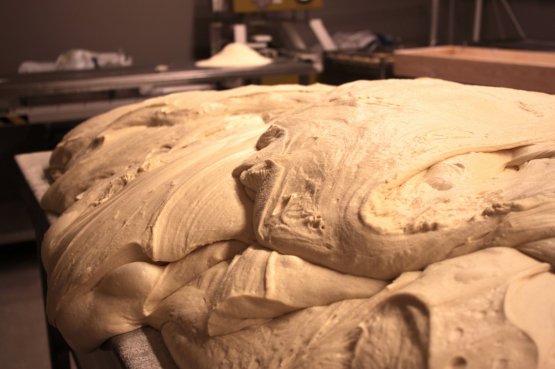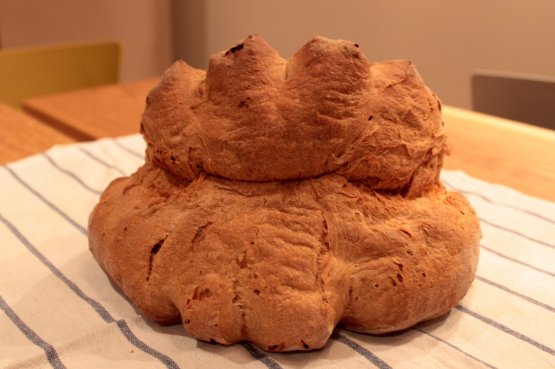Matera, the second town in Basilicata, one of the least known and most extraordinary regions in Italy, is rightly famous for its Sassi, ancient neighbourhoods created by excavating the caves of calcarenite that are today included in the UNESCO World Heritage list. Since a few years ago, however, the name of Matera is also tied to the bread they produce here, and which today can be found in the best restaurants and shops in Italy and beyond.
The merit goes most of all to Gianni Schiuma, tireless promoter of the city and its products through a brand called Mangiare Matera and collaborator of the Consorzio di Tutela, which was born a few years ago following the impulse of some bakers in town who wanted to bring this product back to its original identity by using only local durum wheat flour and is currently going a phase of restructuring.

This bread has ancient origins, permanently tied to the peasant culture of this territory where durum wheat has always been the undisputed protagonist, in the fields and in the kitchen. It has a unique flavour and aroma given by the use of local durum wheat re-milled with local wheat varieties - at least 30% of
Senatore Cappelli – and mother yeast. Just like it was once the custom in the “cave-homes” in the Sassi, when women would knead great loafs of bread weighing 5 kilos that would have to be enough for the family for one week, and would stamp their initials with a wood stamp (a young artisan in Matera,
Massimo Casiello, still produces them) and bake them in the communal oven.
«Today the customs have changed – says
Schiuma – this bread keeps its flavour and fragrance even for 9 days but people prefer to buy less bread in order to have it always fresh, asking for mini 250 grams loaves». This is a real insult to this monumental bread, whose secrets include its imposing shape and its thick and compact crust (
corteccia), besides the use of autochthonous durum wheat and yeast that in just a few hours, every night, create the “miracle” of a prodigious leavening and a long lasting loaves.
This is what happens, for instance, in one of the town bread ovens, that of
Patrizia Perrone, where every night,
Enzo and
Nino, expert bread makers, knead and bake loaves following the steps of the traditional process: the dough leavens for about 45 minutes and is then poured on the table where it is divided and weighed. Meanwhile, the bundles of wood are lit so as to bring the oven to the right temperature.
The loaves leaven for further 45 minutes and then they are finally shaped by folding them, squeezing them to finely capture the air and sometimes cut in order to create the traditional “crests” (though some prefer them smooth). One at a time, with a shovel, they are placed in the now clean oven where they will bake at a gradually decreasing temperature for two hours and a half, one next to the other, without ever touching each other and raising their height.
«It’s a hard job, there are no breaks – there are also brioches, rolls and taralli to bake – and nobody wants to do it anymore», says
Enzo, the “senior” baker who at 55 has already accumulated 44 years of experience.

The bread loaf, in the “crests” version, is baked and ready, in all its simple beauty
Perhaps it is for this reason that we should once again learn how to eat bread: the one that is good for a week and longer does not bloat and is not harmful. And it is on this very concept of food as a nourishment for the body and the soul and on the importance of bread and agricultural, dietarian and culinary traditions that the conference entitled
Come sa di sale lo pane altrui [How salty does the bread made by others taste] was created.
It is scheduled in Matera from September 5th till the 7th and will explore the cultural landscape, the history, archaeology and architecture of bread but also its economic and touristic potential.